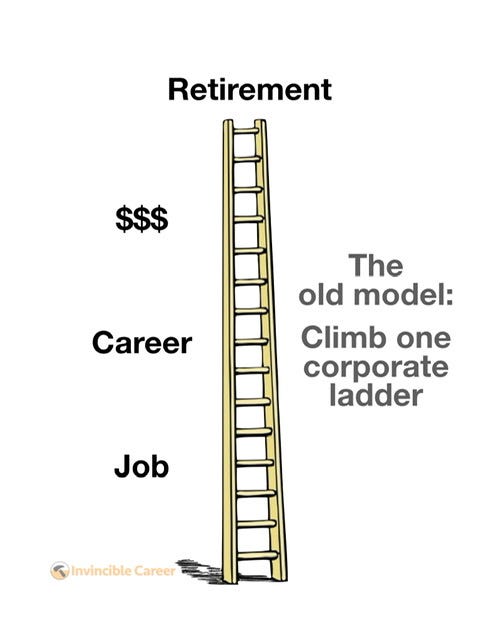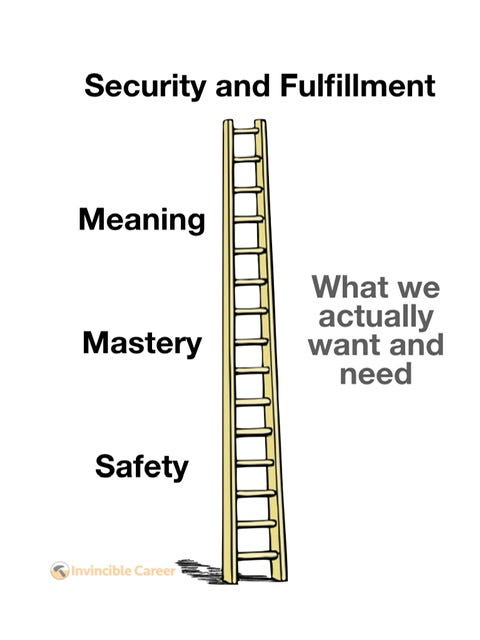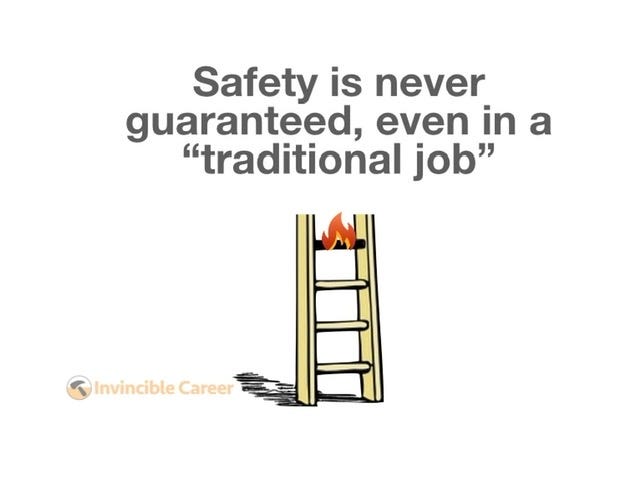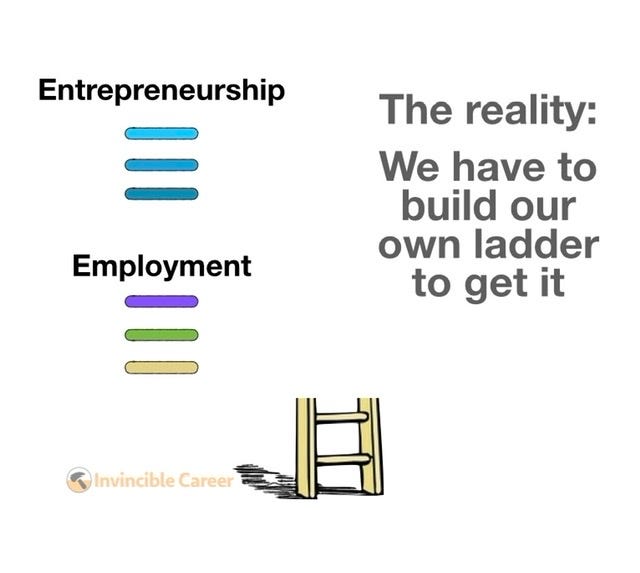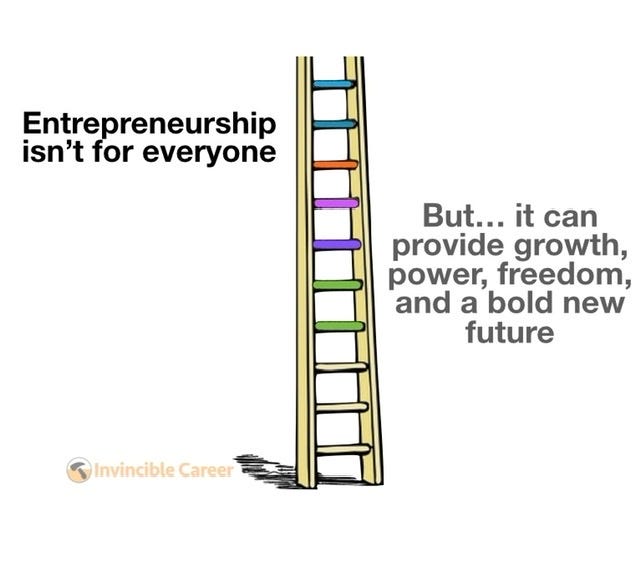
As I’ve mentioned before, I like to start my day with journaling and sketching. Recently, the concept of career ladders kept popping into my head, prompting me to think about how much careers have changed in my lifetime.
A few days ago, I sketched some rough stuff in a paper notebook so that I wouldn’t forget about it. But today, I committed the ideas to a few illustrations. As you will see below, these are a bit rough.
Yes, I was a “designer” for many years, but not that kind of designer. I was an interaction designer, focusing on business models, product requirements, user needs, engineering capabilities, information architecture, task flows, layouts, and prototyping. I can do a little visual design, but nothing like my more talented friends who create works of art.
But sketching and simple illustrations help me think through ideas and get them out of my head. The process allows me to turn them into something I can share with you. So, here we go!
The old model
My parents and grandparents had careers that followed the ladder illustrated below.
Go to school.
Graduate and get a job.
Stay with that employer for life.
Hopefully, you climb the ladder, move into management, and make more money.
Then, that magical day finally arrives: Retirement.
Retire and never work again.
Golf, fish, and play bingo for the rest of your life.
I’m Gen X, and I thought my career would follow the same path. I’d climb the corporate ladder, just as our parents did, and strive for that golden retirement age. Well, the world changed (and I didn’t end up working for NASA). Very few people commit to an employer for the entire duration of their careers now.
What we actually need
I was taught to “chase money” and pursue a career that would lead to financial success. That’s what mattered most.
Buy “happiness” through material possessions that signal your success (e.g., big house, fancy car, a boat), raise a family, and pump money into your retirement account. That’s how you achieved safety and security.
Unfortunately, that model actually leaves you pretty vulnerable. Chasing money and spending more and more money to be happy becomes a trap. Leaving your fate in the hands of an employer isn’t very safe.
And safety is essential! The foundation of your career ladder depends on it.
It’s almost impossible to focus on the mastery of your craft and profession when you don’t feel safe at work. And, without safety, finding purpose and meaning is a distant dream.
However, safety goes beyond a steady paycheck. We want to feel safe at work without the looming threat of being fired and corporate layoffs hanging over our heads. We want to work in a safe environment without bad bosses berating us, toxic coworkers undercutting us, and corrosive cultures damaging our confidence.
In other words, we need psychological safety, too. As Google discovered in their research to discover the secrets of effective teams:
"Psychological safety refers to an individual’s perception of the consequences of taking an interpersonal risk or a belief that a team is safe for risk-taking in the face of being seen as ignorant, incompetent, negative, or disruptive. In a team with high psychological safety, teammates feel safe to take risks around their team members. They feel confident that no one on the team will embarrass or punish anyone else for admitting a mistake, asking a question, or offering a new idea."
How do you build the rungs in your ladder to climb to higher levels of career safety? I’ve talked about this before when I identified how we become vulnerable and what we can do about it.
A few activities that build your security and safety:
Hone your craft and become incredibly good at what you do. Oh, and don’t forget to learn how to use AI well (it’s here to stay).
Identify your unique talents, strengths, and experiences and double down on making yourself valuable and indispensable (e.g., no one can be you, and no one can do precisely what you do).
Mitigate your weaknesses and vulnerabilities (e.g., some “weaknesses” are really just undiscovered and undeveloped strengths).
Always be networking, connecting, and discovering opportunities.
Always be open to conversations and interviews (keep your interviewing skills sharp).
Create additional sources of income (e.g., entrepreneurial explorations, side hustles, passive income).
Manage your budget, reduce expenses, and build a financial cushion.
For example, I was lucky to have developed a robust professional network early in my career. My Apple colleagues have stayed in touch and supported one another for over 20 years. Later, this network opened doors for me with multiple startups, employers, and clients.
I felt a sense of safety, which gave me the courage to take risks that advanced my career and business. I always knew that I could contact a few people and have a new job within a week or two.
That feeling of security is invaluable. Take the time to build it for your career, and it will enable you to focus on the higher rungs of mastery and meaning.
The harsh reality of employment
Looking back now, I’m amused by my naivete as a young employee in the tech industry. I thought my career would take care of itself if I worked hard, put in long hours, and went above and beyond.
My younger self also thought that my job would always be secure, I’d never be fired, and I would never experience a corporate layoff. That all changed at IBM when it executed the first layoff in its corporate history. I was there that day, and it was a surreal experience.
I also experienced multiple rounds of layoffs during my time at Apple. I still think back to that time and how my answer to one question probably saved my job (e.g., “You’re familiar with UNIX, right?”).
I can’t really blame young me, however. Multiple people and educators assured me that great workers don’t lose their jobs. Hard workers are always in demand.
Sure, there is some truth to that. But, as I discovered at IBM, Apple, Yahoo, and my first startup experience, there are no guarantees.
You could be amazingly talented and valuable yet still lose your job due to poor corporate planning and decisions requiring massive strategic changes, project cancellations, budget cuts, the sunsetting of products, and layoffs.
When the rung you are standing on starts burning, you have no choice but to find a way to rebuild it, often on your own.
Own your ladder
The sooner you accept full responsibility for your professional growth and career ladder, the better off you will be. No one cares about your career as much as you do. No boss will take ownership of your path and future.
You must build your own ladder to get the safety, growth, security, and fulfillment you need. The old days are behind us of joining a company and climbing an internal career ladder for the rest of your professional life.
Building your ladder may feel overwhelming, but it is ultimately empowering. Your career exists far beyond the walls of any one company. You get to plan the path that is best for you.
In this modern, connected, remote, global working world, you have an almost infinite number of “rungs” to choose from. Intentionally choose employers who will give you the skills, knowledge, and experience you need to keep climbing your unique ladder.
You can even select rungs from the wonderful world of entrepreneurship, as I have. It is easier than ever before to transition from employee to solopreneur.
Own your growth plan
If you’re lucky, you may find yourself working for great managers and leaders who want to help you grow within the company. They will challenge you, mentor you, and pull you up the ladder into roles that elevate you and tap into your potential.
However, not everyone is so lucky. Most managers are pretty average. A few are downright terrible and destructive.
You may be on your own or need to work with a career coach. But, no matter what you do, advancing your career and investing in your professional development requires some discomfort and conquering fears.
Comfort leads to stagnation. Growth requires stepping into more challenging roles, often moving to new employers, and assuming greater risks. Build your career ladder with the employers and positions that will help you climb to reach the vision you have for your professional life.
Create a plan that puts you on the path to professional mastery. You want to become so good at what you do — and so well-known in your industry — that you are always in demand. When you climb the ladder to that level of extreme competence and excellence, you become an opportunity magnet.
Hiring managers and recruiters will be contacting you regularly and attempting to poach you from your current employer. You don’t have to hunt for new jobs. They find you.
An entrepreneurial view
I often talk about treating your career like a business. And, the product that the business sells is you. So, in that sense, we all need to be more “entrepreneurial.” We all should do a better job of marketing and promoting ourselves.
However, I also believe that true entrepreneurship (i.e., building your own business) provides security, freedom, and growth in ways that no 9-5 job ever can.
You will never fire yourself (and please don’t mistreat yourself 😉).
You will never be forced into early retirement by age discrimination.
You can build your business 100% around your talents, strengths, experience, and interests.
You get to decide where, when, and how you work every day.
You get to decide with whom you work every day.
You get to plan a future that maximizes your safety and security, professional mastery, and purpose and meaning.
Is it easy? No, building a business is hard work. But at least you control your destiny. The harder you work, the more you get out of it, and the better your decisions, the better your outcomes.
It is certainly possible to find purpose and meaning in the work you do for an employer. Some of my friends are working on solutions that will change the world.
But if you aren’t finding meaning in your day job, it’s crucial to create it for yourself. I often say that entrepreneurship is one of your best opportunities to build your life around something that matters to you. You literally get to define what you do, so you can decide how you might change people’s lives and make a difference in the world.
Don’t we all want security, happiness, and fulfillment?
Hey, if you’ve somehow found a way to get all the factors below with a trusted employer who will never, ever let you down, more power to you!
Fulfillment
Security
Meaning and Purpose
Freedom
Financial independence
Mental, emotional, and physical health
Happiness
However, if you desire all of this and that magical employer still hasn’t shown up in your life, it’s time to take ownership and make it happen. You deserve it, and life is too short to keep waiting.
Here are some final thoughts about retirement. Maybe you are on a good path in your career as an employee and are set up pretty well for your retirement. But, I’m already seeing that most of us (e.g., Gen X, Millennials, Gen Z, Gen Alpha, and beyond) don’t want to fully retire the way our grandparents and parents did.
We have things we want to accomplish that have nothing to do with our employers and professions. We have personal goals and dreams that we want to see come true. That’s what gives our lives meaning and purpose.
Once we’ve locked in our financial security and independence, an exciting phase of life can begin. We have time to pursue fulfillment in a way that many people from previous generations could not.
It’s a gift. Take advantage of the opportunity!
I’m Larry Cornett, an executive coach who works with ambitious professionals to help them reclaim their power, become more invincible, and create better opportunities for their work and lives. Do more of what you love and less of what you hate!
📕 Check out The Invincible Daily Journals!



